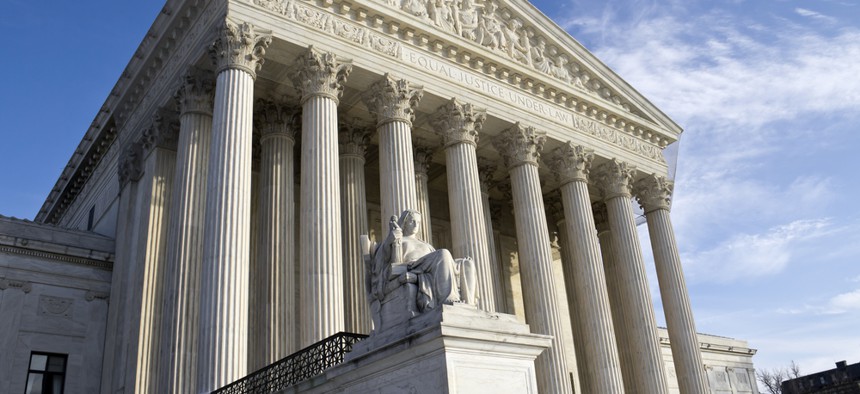The Four States the Supreme Court Wants to Hear From on Gay Marriage

M DOGAN / Shutterstock.com

Connecting state and local government leaders
The justices will examine same-sex marriage bans in Kentucky, Michigan, Ohio, and Tennessee starting in April.
In what's bound to be a "blockbuster" year for the Supreme Court—just look at the current Obamacare brawl—the justices have set a date to start hearing arguments on state gay-marriage bans.
The court announced Thursday it will hear oral arguments on April 28 on whether states can ban gay marriage within their borders and refuse to recognize same-sex marriages performed in other states. The final ruling, anticipated in late June, will decide whether these prohibitions violate the constitutional right to equal protection under the law.
The justices will examine bans in four states—Kentucky, Michigan, Ohio, and Tennessee—that were upheld by the U.S. Court of Appeals' Sixth Circuit in November in a 2-1 ruling. Because several other appeals courts have ruled in favor of same-sex marriages this year, the Supreme Court is intervening so the courts aren't split.
The Kentucky case stems from a district judge's ruling in February 2014 that the state's marriage ban violated equal protection. The ban was first codified in the state constitution in 2004, with 75 percent of voters approving the measure. Recent polling, however, suggests Kentuckians aren't as united on the issue as they once were; now 55 percent oppose same-sex marriage.
With a change in voter sentiment, Kentucky Gov. Steve Beshear, who's against same-sex marriage himself, indicated he's ready for the legal battles to be over. "Any further delay in the Court's consideration of these cases would prolong the instability and uncertainty which states and families currently endure," he said in a statement in January when the Supreme Court announced it would weigh in on the Sixth Circuit ruling. "Kentuckians, and indeed all Americans, deserve clarity and finality on this matter, and the assurance that the law will be consistent across state lines."
In Michigan, where a ban also passed in 2004, gay marriage was legal for a single day last year, after a U.S. District Court decision ruled the state's ban unconstitutional. About 300 couples were issued marriage licenses and married that day before the state attorney general filed an emergency stay with the Sixth Circuit, essentially reinstating the ban. (The Sixth Circuit then upheld the ban in November.)
Though some speculated that Michigan Gov. Rick Snyder would appeal a ruling forcing the state to recognize those marriages, last month he decided against doing so.
Like his Kentucky counterpart, Snyder seems to want to move on from the gay marriage fight: He said last month that an "expedient resolution" must be made "that will allow people in Michigan, as well as other states, to move forward together on the other challenges we face."
Ohio, another state that passed a ban in 2004, was ground zero for the Sixth Circuit decision, as the court is based in Cincinnati. Its citizens are fairly split—by 3 percentage points—on gay marriage.
Here, the challenges to the state's ban stem from what is typically a routine process: the filling out of birth and death certificates. Three couples want Ohio to recognize their out-of-state marriages so that both partners' names can be listed on their children's birth certificates, and two couples initially challenged the ban so that in the event of one partner's death, the surviving spouse could be listed on the deceased's death certificate.
Tennessee's gay marriage fight was brought to federal district court in 2013, when the National Center for Lesbian Rights filed suit on behalf of four couples, all of whom moved to Tennessee after marrying in other states. The Nashville federal court ordered the marriages be recognized, the state appealed, and the case was also sent to the Sixth Circuit.
In the past year, the percentage of people who oppose gay marriage in Tennessee has dropped 11 points, from 64 percent to 55 percent. And though that particular poll suggested religious faith was a big indicator of people's attitudes—with many evangelical Christians standing firm against gay marriage—even that might be changing: A major evangelical congregation near Nashville publicly threw its support behind gay marriage earlier this year, and other religious organizations have done the same.
It seems unlikely that such a community would support gay marriage, but the tide has been turning for years. The majority of Americans support it, and nearly 11 years since Massachusetts became the first state to legalize same-sex marriage, gay marriage is now legal in 37 states (though one of those, Alabama, remains in limbo).
Whether the states will have any say at all after June is what gay-marriage advocates—and their opposition—want to know.





